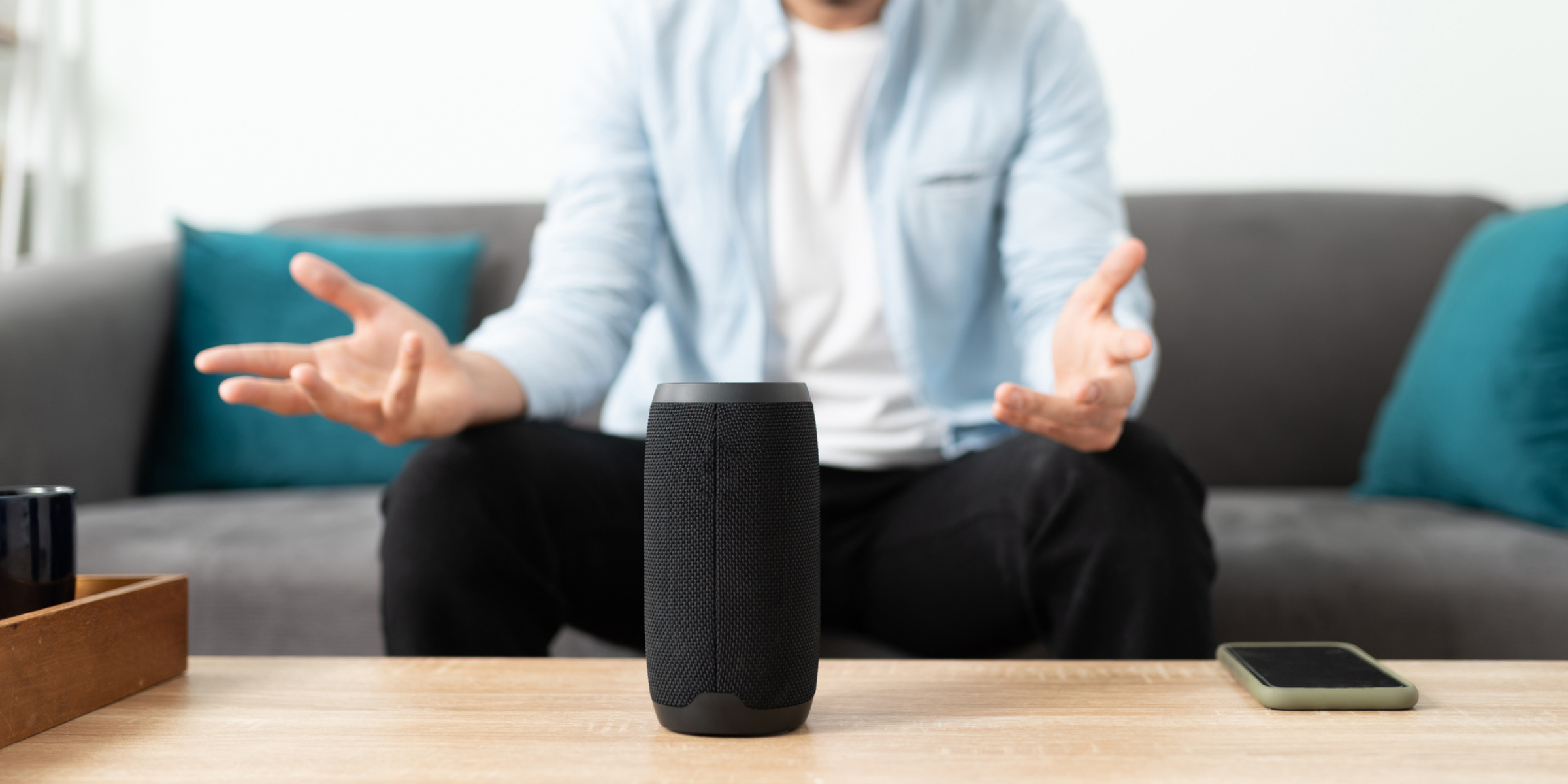Imagine yourself walking into your home after a long, tiring day, only to be greeted by your favorite music or the soothing scent of lavender as your smart speaker diffuses essential oils in the living room. Sounds like a dream, right?
But with the advent of smart speakers, this dream has become a reality for many. These tiny yet powerful devices have taken the world by storm, making our lives more convenient and efficient than ever before.
A smart speaker is a voice-activated device that uses artificial intelligence to interact with users. It can answer questions, play music, make phone calls, control smart home devices, and more. The device has a built-in microphone that listens for voice commands, which are processed by virtual assistant software such as Amazon Alexa, Google Assistant, or Apple Siri. The assistant then responds to the command with audible feedback through the speaker. Some smart speakers also have touch controls and LED lights for visual feedback.
Join us as we unravel the mystery behind this revolutionary gadget and explore the wonders of smart technology!
Smart speakers and their purpose
A smart speaker is a voice-activated device designed to help users with everyday tasks, and transform our interaction with technology in our homes.
These intelligent, user-friendly devices are equipped with a built-in virtual assistant that relies on artificial intelligence to respond to voice commands and manage tasks such as playing music, setting alarms, and controlling other smart home devices.
The most popular smart speaker brands include Amazon, Google, Apple, Sonos, and Bose. Amazon’s smart speakers have achieved global sales exceeding 100 million units and include a voice assistant named Alexa.
The purpose of a smart speaker is to provide you with a seamless and hands-free way to access information, control your home environment, and stay connected. At the core of a smart speaker’s functionality is its capacity to understand human speech and react accordingly through its virtual assistant.
Voice recognition technology, such as Amazon’s Alexa, Google’s Google Assistant, and Apple’s Siri, is designed to learn from your accent and vocabulary over time, enabling it to better understand you and provide more accurate responses.
Smart speakers have experienced a surge in popularity in recent years, with an estimated 39 million Americans (16% of the population over 18) owning a smart speaker as of winter 2017. Ongoing technological advancements and increasing adoption rates suggest that smart speakers are transforming the way we interface with technology and manage our daily routines.
How smart speakers connect to devices
A smart speaker is a highly versatile device that can connect to various electronic gadgets to perform a host of tasks and provide a seamless, hands-free experience.
The key to this seamless integration lies in the speaker’s ability to connect wirelessly to other devices, such as smartphones, tablets, and other smart home appliances.
Typically, a smart speaker connects to devices using a Wi-Fi network or Bluetooth technology. This allows users to control the speaker through a mobile app and send audio content, like music or podcasts, to the speaker.
Smart speakers commonly have integrated voice assistants, like Amazon’s Alexa, Google’s Assistant, or Apple’s Siri, which allow users to give vocal commands to the speakers. This results in improved accessibility and convenience as it communicates with connected devices.
Some advanced smart speakers are capable of connecting directly to music streaming services, like Spotify or Apple Music, allowing users to enjoy their favorite tracks without having to use a separate device. Moreover, smart speakers can also access contact lists and make hands-free calls, adding to their functionality.
Smart speakers are compatible with various smart home devices, such as lights, locks, thermostats, and security systems. Users can control these devices through the smart speaker using voice commands or by creating routines that automate certain tasks. As smart speakers continue to evolve, they are becoming increasingly popular, serving as the central hub for smart home management.
Voice assistants in smart speakers
Voice assistants in smart speakers have revolutionized the way we interact with technology in our everyday lives. These virtual helpers, such as Amazon’s Alexa, Google Assistant, and Apple’s Siri, are designed to simplify tasks and provide hands-free control over various aspects of our environment.
Using advanced voice recognition software, smart speakers listen for a specific hot word (or phrase) to activate the assistant, allowing users to ask questions or issue commands through natural language.
The voice recognition software in smart speakers operates by processing voice commands, understanding the context, and providing appropriate responses and actions. As users interact more with the virtual assistants, they adapt and learn to better understand accents, vocabulary, and preferences, resulting in improved communication and functionality over time.
Many popular smart speaker brands, such as Amazon Echo, Google Home, and Apple HomePod, have their own proprietary virtual assistants.
However, some manufacturers, like Bose and Sonos, incorporate third-party virtual assistants like Alexa and Google Assistant into their devices, offering customers more choices and flexibility.
Voice assistants in smart speakers offer an extensive range of capabilities tailored to accommodate diverse needs and preferences.
From playing music and setting timers to providing weather forecasts and controlling other smart home devices, these virtual helpers have become integral to enhancing convenience in our daily routines.
As technology continues to advance, more features and capabilities can be expected to be added to these voice-activated marvels, redefining the way we perceive and utilize smart devices in the future.
Smart speaker designs and sizes
Smart speaker designs and sizes cater to a diverse range of preferences, aesthetics, and intended uses. These voice-activated devices come in various shapes and sizes, built to seamlessly blend with the surroundings or serve as a statement piece in a room. The compact designs, often intended for tabletop or countertop placements, help ensure that smart speakers fit effortlessly into any living space.
Small-sized smart speakers, such as the Amazon Echo Dot and Google Nest Mini, are perfect for placement on desks or bookshelves, offering a personal assistant within reach. And because they’re voice activated they can be placed in awkward spaces but still be used!

These devices focus on the assistant’s capabilities, with the audio quality being secondary. On the other hand, larger options like the Apple HomePod and Sonos One deliver not only robust virtual assistant features but also high-end audio performance, making them ideal for filling a room with immersive sound.
Portable smart speakers, powered by built-in batteries and often featuring dust and water resistance, offer versatility and mobility. These wireless models, like the Ultimate Ears Megaboom, include added conveniences like handles or hooks to make carrying or mounting them easier.
In summary, smart speaker designs and sizes offer a myriad of options to suit individual needs and preferences. From compact assistants to high-end audio performers and portable companions, smart speakers continue to evolve and cater to the diverse requirements and styles of modern living.
Advantages of smart speakers in a smart home
Smart speakers have revolutionized the way we interact with technology in our homes, making everyday tasks more convenient and efficient. Here are five primary advantages of incorporating smart speakers into a smart home:
- Voice-activated controls: The most significant benefit of employing smart speakers in a smart home is the voice-activated control they offer. Users no longer need to fumble with buttons or navigate complicated interfaces; instead, they can issue simple voice commands to control various smart devices, such as lights, thermostats, and appliances.
- Seamless integration: Smart speakers integrate smoothly with various smart home devices, creating a cohesive ecosystem that functions seamlessly. Popular brands such as Amazon Echo and Google Home support a wide range of smart products, making it easy to set up and manage all connected devices in your home.
- Centralized management: With a smart speaker, users can manage multiple smart devices from a single, centralized location. This allows users to control and monitor devices, set up specific routines, and create custom schedules, all without having to access each device individually.
- Enhanced entertainment: Smart speakers elevate home entertainment experiences by providing easy access to music, podcasts, and radio stations through simple voice commands. Furthermore, some advanced models offer adaptive audio capabilities that optimize sound quality based on the listener’s location.
- Improved accessibility: Smart speakers are incredibly beneficial for individuals with mobility or vision impairments, as the hands-free, voice-activated interface allows for easy access to information and control over smart home devices. This can enhance the quality of life for individuals by promoting increased independence and convenience.
Popular brands of smart speakers
Smart speakers are rapidly becoming a mainstay in modern homes, enhancing our daily lives with voice-activated services and seamless connectivity. A handful of prominent brands stand out among the wide variety of options available on the market. These popular smart speaker brands are known for their user-friendly interfaces and advanced features that cater to the unique needs of consumers.
Firstly, Amazon’s Echo series, powered by Alexa, has earned a reputation for its versatile capabilities and affordable pricing. With multiple models to choose from, such as the Echo Dot and the Echo Show, Amazon ensures there’s a smart speaker fit for everyone.
Secondly, Google’s Nest line, formerly known as Google Home, features Google Assistant at the heart of its devices. From the entry-level Nest Mini to the advanced Nest Hub Max, these speakers are praised for their exceptional integration with other Google services and their ability to understand and process natural language.
Apple’s Siri-enabled HomePod and HomePod Mini are designed to cater to the loyal Apple fanbase. With their sleek designs and seamless integration with other Apple devices, these speakers focus on enhancing the user experience within the Apple ecosystem.
Lastly, Sonos stands out with its high-quality audio output and unique multiroom audio capabilities. The Sonos One and the newer Sonos Era series provide stunning music quality, alongside compatibility with Amazon’s Alexa and Apple’s AirPlay 2. However, the newest models do not support Google Assistant, suggesting room for improvement.
To make the most informed decision, experts encourage potential buyers to consider their preferences on price, audio quality, integration and compatibility with other smart home devices, and personal inclination toward specific voice assistant platforms when choosing among these popular smart speaker brands.
Wireless capabilities of smart speakers
Smart speakers have transformed the way we interact with technology in our homes, offering a diverse range of features and capabilities. One of the most remarkable aspects of these devices is their wireless functionality. To understand their wireless capabilities, let’s dive into how they work and how they interact with other devices in your home.
First and foremost, smart speakers connect to the internet via Wi-Fi, enabling seamless communication with virtual assistants like Alexa, Google Assistant, or Siri. This Wi-Fi connection allows them to access various services, such as playing music, providing weather updates, and controlling smart home devices. It also lets users control the speaker using an app on their smartphones.
Additionally, most smart speakers offer Bluetooth connectivity, allowing them to receive audio content such as music or podcasts from mobile devices. With the combination of Wi-Fi and Bluetooth, users have the flexibility to stream audio over different networks, based on their preference and device compatibility.
While all smart speakers are considered wireless in terms of audio streaming, not all of them are entirely wire-free. Some require a wired connection for power – however, portable smart speakers come with built-in batteries, providing a true wireless experience. Keep in mind that these battery-powered models might sacrifice some sound quality or features in exchange for their portability.
In summary, the wireless capabilities of smart speakers have revolutionized our interaction with technology, offering convenience and ease of use, making it a popular choice for modern homes.
Smart speaker capabilities beyond music playback
Smart speakers have come a long way since their initial introduction as simple audio devices. While they still excel at playing your favourite tunes, these innovative gadgets have gained an impressive range of capabilities that go far beyond just music playback.
Due to their built-in voice assistants, such as Amazon’s Alexa, Google’s Assistant, or Apple’s Siri, smart speakers can now perform various tasks, making them an essential component of a modern home.
One of the most notable features of smart speakers is their ability to answer questions based on factual data, providing instant information about the weather, news headlines, or general knowledge. They can also manage your calendar by setting reminders, alarms, and creating events— all with a simple voice command. Voice assistants even have the capacity to learn from your conversations, improving their understanding of your accent and vocabulary over time for more accurate responses.
Smart speakers can also serve as the central control hub for other smart home devices, such as lights, thermostats, and security cameras.
This allows users to efficiently manage their home’s settings by controlling these connected gadgets through voice commands. In addition to these practical functions, smart speakers offer various entertainment options like trivia games, jokes, and guided meditation sessions.
In conclusion, smart speakers have evolved significantly, making them a versatile and useful addition to any home. With a myriad of capabilities beyond music playback, these devices can simplify daily tasks, provide informative answers, and even help you unwind after a long day.
The industry behind smart speakers
The smart speaker industry has experienced significant growth in recent years, with an increasing demand for such devices in today’s tech-savvy households. These voice-activated devices are equipped with virtual assistants that assist users in various tasks, such as playing music, setting reminders, and controlling smart home appliances. Large tech companies, including Amazon, Google, Apple, Sonos, and Bose, are reputable brands that manufacture smart speakers to cater to this growing demand.
According to NPR and Edison Research’s winter 2017 report, an estimated 39 million American adults, or approximately 16% of the population over 18, owned a smart speaker.
Among the most popular smart speakers, Amazon’s Echo range, which includes the compact Echo Dot, has reportedly sold over 100 million units worldwide. The increasing popularity of these devices can be attributed to their affordable pricing, with certain models costing as low as £49.99 and providing various features, including wireless connectivity and hands-free calling.
The success behind smart speakers mainly lies in the ability of their virtual assistants, such as Amazon’s Alexa, Google Assistant, and Apple’s Siri, to recognize and respond to voice commands accurately. These virtual assistants are continuously improving their understanding of accents and vocabulary over time, ensuring better responses for users. This continuous improvement, coupled with the convenience offered by these devices, makes smart speakers an indispensable part of the modern home, propelling the industry’s expansion.
Privacy concerns and data security with smart speakers
As smart speakers continue to gain popularity, concerns around privacy and data security have emerged. Despite their useful features, many users worry about these devices monitoring their conversations and collecting their personal information.
Smart speakers function with the help of voice assistants that use voice recognition technology to interpret human speech and perform tasks based on their commands. To be effective, these devices must constantly listen for their assigned wake word (e.g., “Alexa,” “Hey Siri,” or “OK, Google”). Once activated, smart speakers record the following voice command and send it to a cloud server to be processed.
The listening process, necessary to determine the wake word, has raised questions about smart speakers eavesdropping on their users. While these devices do analyze short audio snippets, they only transmit the recordings if the wake word is detected, deleting them otherwise.
Moreover, major smart speaker companies like Amazon, Google, and Apple have revealed employing human reviewers to help improve their voice recognition technology. This revelation has raised concerns about potential exposure of users’ private and sensitive information.
To protect your privacy and data security, consider muting your smart speaker when not in use, deleting stored voice recordings, and adjusting settings to limit data retention. These measures can enable you to enjoy your smart speaker without compromising your privacy.
Can a Rugged Speaker Function the Same Way as a Smart Speaker?
A rugged speaker definition encompasses durability and weather resistance, making it ideal for outdoor use. While a rugged speaker can withstand tough conditions, it may not have the same smart capabilities as a smart speaker, such as voice control or virtual assistant integration.
How Does the TECEVO S100 Bluetooth Speaker Compare to a Smart Speaker?
When comparing the TECEVO S100 Bluetooth Speaker to a smart speaker, there are a few key differences to consider. The TECEVO S100 Bluetooth Speaker offers high-quality sound and portability, while a smart speaker is equipped with voice control and smart home integration. Both have their own unique features and functions.
Final thoughts
Smart speakers have become a popular addition to many households, offering users a variety of tasks such as playing music and creating shopping lists.
With the help of virtual assistants such as Amazon’s Alexa, Google Assistant, and Apple’s Siri, users can access digital services like Amazon Music and control compatible smart home appliances with their voice alone.
Additionally, these devices provide quality sound that is suitable for listening to music or podcasts. As more features are added to these devices, it is clear that smart speakers will continue to be an essential part of many tech-savvy households in the future.





